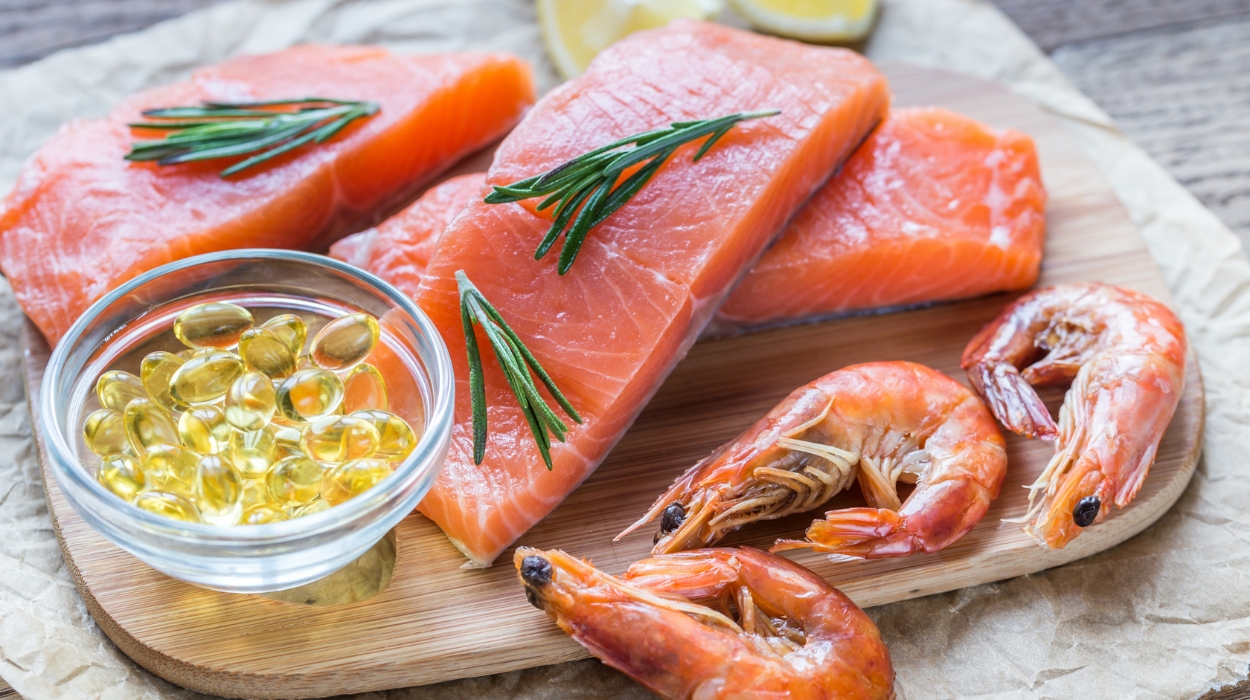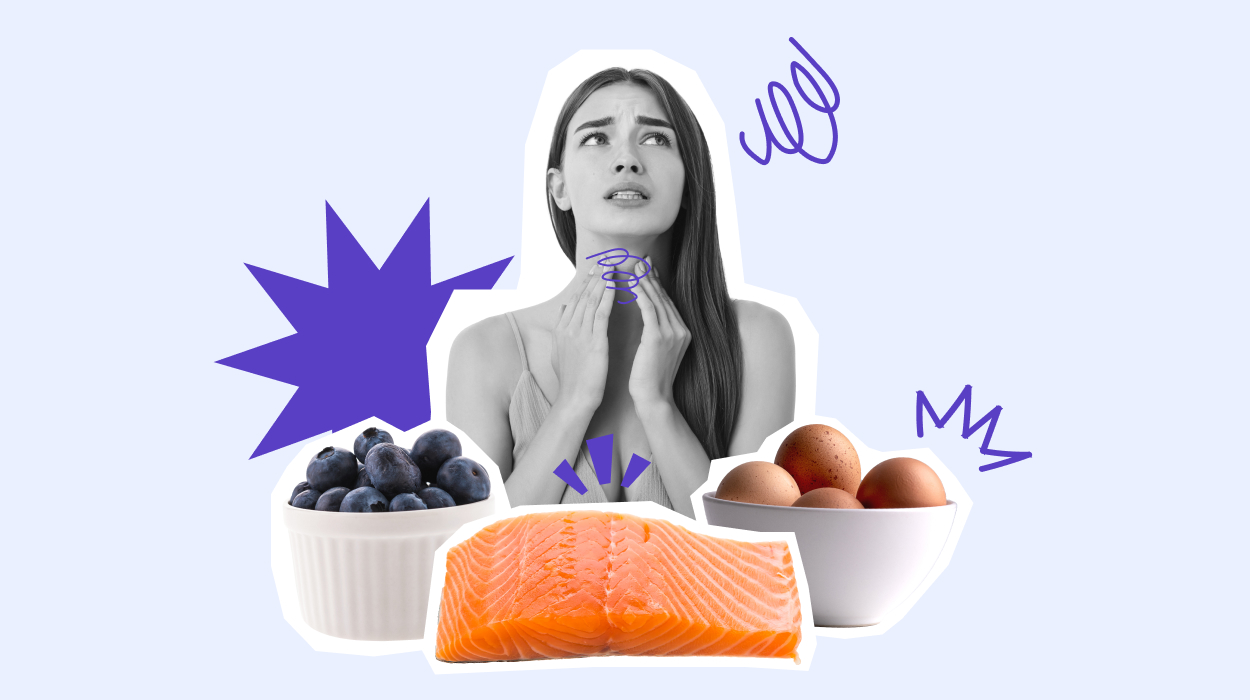Your thyroid gland is responsible for multiple functions, including regulating our basic metabolic rate. Various factors contribute to the optimal functioning of the thyroid gland, including the food we choose to consume.
Consuming a balanced diet rich in nutrients that support optimal thyroid function can help prevent thyroid dysfunction and related health problems. In this context, incorporating specific foods into your diet can provide the necessary nutrients for hormone production and regulation, including iodine, selenium, zinc, and vitamin D.
On the other hand, some foods can interfere with thyroid function and should be avoided or consumed in moderation. Goitrogenic foods such as cruciferous vegetables and soy products can interfere with iodine absorption and hormone production. In this article, we will explore the best foods for thyroid health and what to avoid to support optimal thyroid function and overall wellness.
Foods Good For Thyroid Health
The best foods for the thyroid include:
- Iodine[1]-rich foods: seaweed, fish, shellfish, dairy products, and eggs.
- Selenium[2]-rich foods: Brazil nuts, organ meats, seafood, and whole grains.
- Zinc[3]-rich foods: oysters, beef, chicken, pumpkin seeds, and cashews.
- Iron-rich foods: beef, chicken, turkey, seafood, lentils, and spinach.
- Antioxidant-rich fruits and vegetables: berries, citrus fruits, cruciferous vegetables (cooked), sweet potatoes, and tomatoes.
- Healthy fats: olive oil, avocado, nuts, and seeds.
- Lean protein: chicken, turkey, fish, legumes, and tofu.
The foods to avoid for thyroid health include:
- Soy[4]
- Raw Cruciferous
- Refined Carbohydrates[5]
Top 4 Thyroid Healthy Foods
A balanced healthy diet that includes a variety of whole foods, lean protein, and healthy fats is key to supporting optimal and normal thyroid function.
Eggs
Eggs are an excellent source of iodine, a mineral essential for the production of thyroid hormone levels. In addition to iodine, eggs also contain other nutrients that support thyroid function, such as selenium, zinc, and vitamin D. The yolk of the egg is particularly rich in these nutrients, making it an especially beneficial part of the egg. Eating eggs as part of a balanced diet can help support optimal thyroid health by providing the necessary nutrients for hormone production and regulation.
Berries
Berries are a great source of antioxidants, which can help reduce inflammation and protect against oxidative stress in the body. Inflammation and oxidative stress[6] can both contribute to thyroid dysfunction and damage. Berries are also a good source of vitamin C, which is important for the production of thyroid hormones and helps support immune function. Additionally, berries are low in sugar and high in fiber, making them a great choice for those with insulin resistance or blood sugar imbalances, which can negatively affect thyroid function. Including a variety of berries in the diet can help support optimal thyroid health.
Seafood

Seafood is a great source of nutrients that are beneficial for the thyroid gland. Specifically, seafood is high in iodine, which is an essential nutrient for thyroid function. The thyroid gland uses iodine to produce thyroid hormones, which are responsible for regulating metabolism, growth, and development.
In addition to iodine, seafood also contains other nutrients that are important for thyroid health, such as selenium and omega-3 fatty acids. Selenium is necessary for the conversion of thyroid hormones, while omega-3 fatty acids help reduce inflammation, which can contribute to thyroid dysfunction.
Consuming seafood as part of a balanced diet can support thyroid function and overall health. However, it’s important to be mindful of potential mercury contamination in some types of seafood and to limit intake accordingly.
Brazil Nuts
Brazil nuts are an excellent source of selenium, a mineral essential for thyroid health. Selenium helps the body convert thyroid hormones into their active form and has antioxidant properties that can help protect the thyroid gland from damage. In addition to supporting thyroid function, selenium also plays a role in immune function and may help reduce the risk of thyroid cancer. Brazil nuts are one of the richest dietary sources of selenium, and consuming just one or two nuts per day can provide the recommended daily intake of this important nutrient. However, it’s important not to overconsume selenium, as excessive intake can be harmful.
What Foods To Avoid For Thyroid Disorders?
It’s also important to avoid excessive consumption of goitrogens, such as raw cruciferous vegetables, and to limit the intake of soy products and refined carbohydrates, which can interfere with thyroid hormone production.
Soy
While soy can provide some health benefits, it is not necessarily good for the thyroid. Soy contains compounds called phytoestrogens that can interfere with thyroid hormone production and disrupt the body’s hormone balance. These compounds can also contribute to goiters and hypothyroidism in individuals with iodine deficiency. However, research suggests that moderate consumption of soy products may not have significant negative effects on thyroid function in healthy individuals with adequate iodine intake. As with any food, it’s important to consider individual needs and potential interactions with medication or underlying health conditions when incorporating soy into the diet.
Raw Cruciferous Vegetables
Raw cruciferous vegetables, such as broccoli, cauliflower, kale, and cabbage, contain compounds called goitrogens that can interfere with thyroid function. Goitrogens can reduce iodine uptake in the thyroid gland, inhibit thyroid hormone synthesis, and increase the size of the thyroid gland (known as a goiter). While the effects of goitrogens on thyroid function are generally mild, people with hypothyroidism may be more susceptible to their negative effects. Cooking cruciferous vegetables can help reduce the amount of goitrogens they contain, making them a safer option for individuals with thyroid problems. It’s important to note that individuals with normal thyroid function can still safely consume cruciferous vegetables as part of a healthy, balanced diet.
Refined Carbohydrates
Refined carbohydrates, such as white bread, pasta, pastries, and many processed foods, can have negative effects on thyroid function and overall health. These foods can cause spikes in blood sugar and insulin levels, which can lead to inflammation and insulin resistance. Insulin resistance has been linked to thyroid dysfunction and can interfere with the body’s ability to produce and regulate thyroid hormones.
Refined carbohydrates are also low in nutrients and can contribute to weight gain, another risk factor for thyroid problems. Individuals with existing thyroid problems should limit their intake of refined carbohydrates and focus on consuming complex carbohydrates, such as whole grains, fruits, and vegetables, which provide fiber, vitamins, and minerals to support thyroid health and overall wellness.
Gluten in Hashimoto’s Thyroiditis
Hashimoto’s thyroiditis is an autoimmune disease that affects the thyroid gland, causing it to become inflamed and damaged. There is evidence that suggests avoiding gluten[7] may benefit those with Hashimoto’s thyroiditis.
Gluten is a protein found in wheat, rye, and barley. It can trigger an immune response in some people, leading to inflammation and damage to the thyroid gland. This damage can worsen the symptoms of thyroid disease, such as fatigue, weight gain, and depression.
Avoiding gluten may reduce inflammation and improve thyroid function in some people with Hashimoto’s thyroiditis. However, it’s important to note that not everyone with Hashimoto’s thyroiditis will benefit from a gluten-free diet, and more research is needed in this area.
How Does Food Affect Thyroid Health?

The thyroid gland plays a vital role in regulating metabolism, growth, and development. It produces hormones that influence almost every organ in the body, and a healthy thyroid function is essential for overall health and well-being. The food we eat can have a significant impact on thyroid health, both positively and negatively.
One of the most critical nutrients for thyroid health is iodine, a mineral that is essential for the production of thyroid hormones. Foods rich in iodine include seaweed, fish, dairy products, and eggs. An iodine deficiency can lead to an enlarged thyroid gland, known as goiter, and hypothyroidism, a condition in which the thyroid gland does not produce enough hormones.
Another important nutrient for thyroid health is selenium, a mineral that helps the body convert thyroid hormones into their active form. Brazil nuts, fish, and organ meats are good sources of selenium. A selenium deficiency can lead to an increased risk of thyroid problems.
The food we eat plays a crucial role in our thyroid health. A diet rich in iodine, selenium, and other nutrients can help support optimal thyroid function, while excessive consumption of goitrogens, soy products, sugar, and refined carbohydrates can interfere with thyroid hormone production and prevent an underactive thyroid. A balanced, whole-foods-based healthy diet is key to maintaining thyroid health and overall wellness.
Conclusion
In conclusion, maintaining a healthy thyroid function is crucial for overall health and well-being. Consuming a balanced diet that includes foods rich in iodine, selenium, zinc, and other nutrients that support thyroid function can help prevent thyroid dysfunction and related health problems. At the same time, it’s important to avoid or limit foods that can interfere with thyroid function, such as raw cruciferous vegetables and refined carbohydrates.
By making these dietary adjustments, eating a nutritious diet, and incorporating healthy lifestyle habits, such as regular exercise and stress management, individuals can support optimal thyroid function and promote long-term health and wellness. Keep in mind that thyroid thyroid medication is necessary for some individuals with an underactive or overactive thyroid gland. Talk with your healthcare professional about checking your thyroid gland function at your annual physicals.
Frequently Asked Questions
Soy, raw cruciferous, and refined carbohydrates.
Eggs, berries, brazil nuts, and others.
Selenium, zinc, and Iodine, among other nutrients.
 Expert's opinion
Expert's opinion
